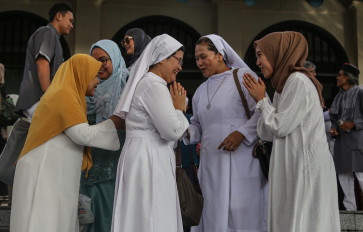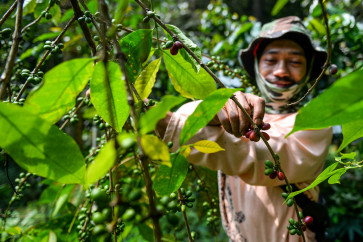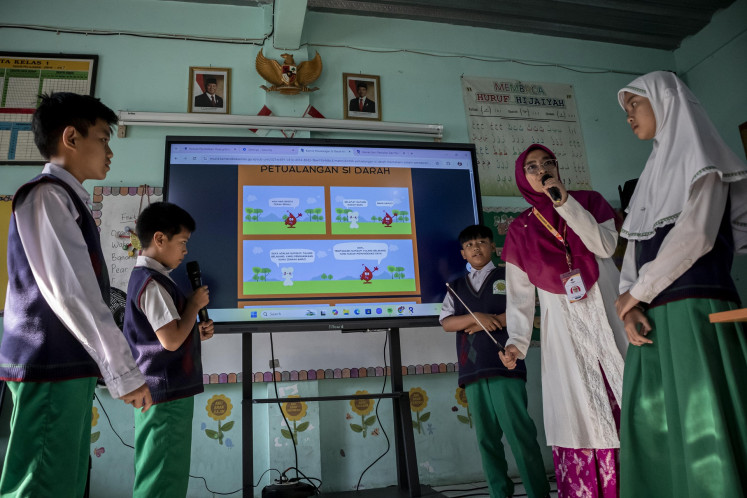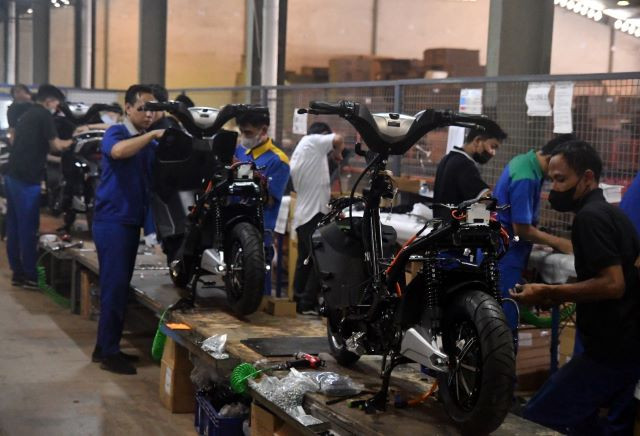Jakarta adds to stock of lowcost, low-rise apartments
The Jakhabitat housing program seeks to offer low-cost housing for Jakarta residents.
Change text size
Gift Premium Articles
to Anyone

A
hmad Riansyah, 30, has been living with his mother and older sister at the BLK Pasar Rebo low-cost apartment block (rusunawa) in East Jakarta since 2020. He previously lived in a rented house nearby.
But as his sister has recently gotten married and her spouse plans to move in, Riansyah has been searching for a place of his own, both to give them space and because rusunawa usually only allow for one nuclear family in each unit.
He is planning to purchase a studio apartment at the Menara Kanaya Nuansa Cilangkap in East Jakarta under the Jakarta administration’s zero down payment scheme, which he found out about through the Sirukim mobile app.
The app was developed by the Jakarta Housing Agency to allow residents to apply for rusunawa and to purchase housing units under the scheme.
Riansyah said he was interested in the payment plan as he would only need to pay monthly installments.
“It would also be more fulfilling for me to own an apartment than to pay rent,” Riansyah said on Wednesday.
He added that he wanted to continue living in an apartment unit because of the availability of facilities usually provided at an apartment block, such as CCTV cameras, a park, a community center, a mail box, a jogging track and others.
“I am used to living in an apartment block. At least I know what to expect,” Riansyah said.
Under the Jakhabitat housing program, besides building low-cost apartment blocks for rent or purchase, the Jakarta administration is also revitalizing residential areas deemed slums through the community action program, in which some 223 community units (RW) across the city have been targeted for renewal.
One of the recently revitalized residential areas is Kampung Susun Kunir in Tamansari, West Jakarta, which is now a new four-story low-rise building consisting of 33 single-bedroom units.
Block management
Marsha Chairuddin, a Kampung Susun Kunir resident and head of its cooperative recalled that while many Kampung Kunir residents’ houses had been demolished in 2015 and dozens of families were evicted in the process, about 33 decided to stay and live in temporary shelters.
“We were fighting to keep what should be ours by right. We stayed to look for solutions to our problems at the time,” Marsha said on Wednesday.
He said Jakarta Governor Anies Baswedan, before being sworn in to his current position in 2017, was invited by the Network of Urban Poor (JRMK) – which Kampung Kunir was a part of – to make a political agreement to protect the rights of the poor in the city and to revive the demolished Kampung Kunir.
Then, in 2018, Kampung Kunir was included on a list of 21 urban kampungs to be revitalized within the 223 RWs in the community action plan for slums, with the construction of Kampung Susun Kunir beginning in October 2021.
By August of this year, the construction was finished and the keys to 33 housing units of Kampung Susun Kunir had been distributed to the the remaining Kampung Kunir residents.
However, Marsha said, the work did not stop there as the Kampung Susun Kunir residents needed to set up a cooperation agreement with the Jakarta administration on the administration of the building, which the residents wanted in the form of a cooperative rather than rental from the city administration.
More to come
Jakarta Housing Agency head Sarjoko said that according to the 2023-2026 regional development plan, the city would continue to provide affordable housing by building more low-cost apartment blocks for rent and sale under the zero down payment scheme.
He said that in 2023, the city planned to build three low-cost apartment blocks, one on Jl. Margasatwa in South Jakarta and one each in the Semper and Rorotan subdistricts of Cilincing, North Jakarta.
Sarjoko added that the city would continue the community action program for up to 223 RWs, which included rebuilding, renovation and resettlement of blighted areas.
“The management of Kampung Susun should ideally be done by a citizen cooperative, so they would secure a long-term tenure but with an initial renting scheme,” Sarjoko said.
He added that the city administration was drafting a gubernatorial regulation that would outline the management of the kampung.









